- Home
- Andrew McGahan
The War of the Four Isles Page 7
The War of the Four Isles Read online
Page 7
Dow turned his gaze to the shipyards. Crowding the various docks were vessels in all stages of construction, swarming with workers. At other docks again, cannon and attack boats were being loaded into the holds of merchantmen, for transport to the battle fleets. A general din of hammering and clanking came clear across the water, and there was a metallic tang to the air, while further along the coast smoke rose in steady black plumes from chimneys that towered over the factory buildings.
Awed by the scale of it all, Dow climbed down and returned to the high deck. Under Emmet Bone’s instructions, the signaller was exchanging messages with the harbourmaster’s tower – a tall structure that rose amid the docks – and shortly afterwards a boat appeared at the Snout’s side to guide them to a berth. By noon, they were warped in and tied up at a small pier that stood apart from the rest of the shipyards.
An official party soon appeared to greet them. It consisted of a troop of armed soldiers led by a tall woman in a stately rag-gown, identifying her as a senior laundress. Captain Fletcher and Cassandra, along with Emmet Bone, his work done, descended to speak with this dignitary. After some discussion, the Ship Kings marine, blindfolded and doomed, was brought on deck and delivered to the soldiers. Then the two laundresses, the pilot, the soldiers and their prisoner all made off into the town.
Captain Fletcher, it seemed, was not invited – and to judge by his mood when he came back on board he was not pleased about it. Yelling curses, he set the crew to work scrubbing the ship clean, then went below to his cabin. But this was also an opportunity to take on supplies, and soon Dow was busy overseeing the loading of fresh-filled water barrels into the hold. All the while, however, he kept one eye on the town, wondering how Cassandra was faring; everything hinged on the message she carried.
The day lengthened to mid-afternoon, the heat growing ever more fierce. The barrels piled up in the hold, and Dow fretted. What was taking her so long? But at last, after several slow hours, Cassandra returned and sought him out on the main deck.
‘The War Master will meet with you,’ she announced without preamble. ‘Tomorrow, at noon.’
‘He approves?’ Dow asked eagerly. ‘He will send a ship to Banishment?’
‘I don’t know yet. I saw him only briefly. He has been apprised of events in the Kingdoms, and of your request, and has agreed to see you; beyond that I can’t say.’ She looked perplexed. ‘I expected you would be refused, but he seemed very interested in you. He said it was more than time that he met the famous Dow Amber.’
‘Then at least my name has served that much of a purpose,’ said Dow.
She laughed uncertainly. ‘In the meanwhile, the War Master has instructed that you be given the freedom of Black Sands during your stay. I am to give you a tour this very afternoon, if you’d like.’
Dow needed no further encouragement. He assigned command of the loading to Nicky, and having obtained permission to go ashore from Captain Fletcher – who scowled mightily at the request but did not forbid it – was ready to depart. At the gangway, he and Cassandra were met by Johannes, who was also going ashore.
‘I am ordered to meet with the armourers,’ explained the blacksmith, ‘to discuss defences against these net-throwing cannon of the Ship Kings. But we can go together as far as the foundries.’
The three descended. It was by then late afternoon, though still very hot. At the end of the pier they came to an embankment topped by a road of crushed coral; the surface may once have been white, but was a dirty grey now. Along it trundled many carts and wagons, heavily laden, and streams of dockworkers moving to or from the shipyards. A busy scene, and yet a torpid one, under such a blazing sky.
They marched south along the road. On the ocean side, sheds and workshops lined the docks, while on the landward side were houses and barracks, but all the buildings had a drab and somehow temporary look to them. It was a work camp rather than a true town, Dow decided. He could see no inns or shops anywhere, and certainly no gardens or trees. Ahead, the chimneys loomed closer, belching their smoke into the still air.
‘How many people live here?’ he asked Cassandra, for he had not forgotten that she had grown up in Black Sands. Her parents had worked in the factories before they died, first one then the other.
‘Some ten thousand or so,’ she answered, ‘though in little luxury, as you see. In truth, the Great Atoll is scarcely fit for habitation. Its soils are infertile, so no crops will grow here, and all food must be brought in by ship. But there are two deep and reliable springs – we will pass by one of them shortly – so at least fresh water is plentiful!’
Johannes chimed in. ‘Another advantage the Atoll has in plenty is secrecy. If not for that, there would never have been a place for our ironworks to take shape. Forty long years it took, smuggling blacksmiths and engineers here one at a time from the Twin Isles, and the iron for them to work, and whale oil too – all right under the Ship Kings’ noses. But from such patient labour and careful stealth came our great discovery of mechanical power.’
Here the blacksmith indicated the chimneys ahead. ‘Behold, Dow. There rise the mighty foundries of the Ironmongers Guild, the finest craftsmen the world has ever known, creators of wonders that were unimaginable only half a lifetime ago.’
Dow had to smile. ‘I asked you once if you knew anything about such men, and about such wonders – remember? You lied to my face.’
‘Ha. So I did. But in all honesty, I knew very little back then. I was but a humble blacksmith when I was dragooned into Ship Kings service, and had never hoped to be inducted into the Guild.’
‘They’re more than just blacksmiths?’
‘Oh yes. The Ironmongers are a high and learned Order, a guild that can only be joined after years of study and trial, and few have achieved it – smithing is just the beginning. Also, they are secretive; quite as secretive, in their way, as the Pilots or the Laundresses. For the process of engine-making is so vital to our war effort, and so disastrous would it be if our enemies discovered it, that the knowledge must be kept hidden at all costs. I doubt that more than half a dozen souls in all the world are fully proficient in the techniques involved – and all of them live here, safely out of the enemy’s reach.’
Dow said, ‘Will the Ship Kings ever build engines of their own, do you think? They have captured attack boats they could dismantle and copy.’
Johannes shook his head. ‘To take an engine apart is no great thing – to build one from the raw metals is something more difficult. The trick lies in casting the iron the right way, for it needs to be marvellously light and yet strong, capable of being honed to the finest edges and most precise bores, and yet endlessly durable. I could not begin to cast such steel, blacksmith though I am.
‘Now, I do not say the Ship Kings could never build an engine. They have skilled artisans of their own, carpenters and sail weavers and the like. In shipbuilding indeed, they far surpass us. But it’s nearly a century since they produced their own ironworkers. They regard it as a menial craft, fit only for crude folk. Cannon and other iron gear they’ve been able to demand from us as tribute, with no need to labour and sweat in their own forges.
‘Well, more fools they. Now, strive as they might, they cannot yet hope to match our Ironmongers Guild. In time perhaps they might produce an engine of their own, in ten years maybe, or twenty. But not soon enough to help them in this war, thank the deeps.’
They walked on. At length, the road came to a paved square, at the centre of which spread a large oblong pool, its waters a deep and startling blue amid the grey brick and smoky air. It was a natural feature, Dow guessed, for its rim was of native stone.
‘This,’ said Cassandra, ‘is the Lesser Spring. It rises from far below, and is always full.’
At one end of the pool old women and children were busy filling buckets. But at the other end a bank of mechanical pumps throbbed and hissed, their pipes feeding into a great iron tank that stood there, from which more pipes ran off in all directions, presumably
to other watering points about the town.
‘And the other spring?’ Dow asked.
Johannes nodded to the far side of the square, indicating the great building that rose there beneath the chimneys, brick-walled and black with soot. ‘The Major Spring lies within – and all its water is reserved for the Ironmongers. Steel-making is a thirsty business. But to say more is forbidden. Nor can your tour include the foundry, I’m afraid.’ He gave them a half salute. ‘I’ll see you back at the ship.’ And with that, he strode off towards an arched entryway, where dispassionate armed guards awaited his approach.
‘There are fairer sights to see anyway,’ said Cassandra. ‘This way.’
To the right of the pool a wide street ran away west, paved in stone, the only cross-street Dow had yet seen. They followed it. It sloped upwards; in fact, at this point a low hill sat athwart the sandy ribbon of the Atoll, like a single pearl fixed upon an otherwise empty necklace.
They crested the rise, and into view at last sprang the vast expanse of the inner lagoon, its further rim still lost beyond sight. Under the lowering sun the water’s surface gleamed like black silver, unruffled by any wind; a sea within a sea within a sea.
At their feet, the hill sank away to the black sand of the inner beach. But the street continued on. Mounting stout ramparts it crossed onto a great pier that ran directly out into the lagoon for hundreds of yards. At its end, this structure widened into an immense platform, and atop this platform rose a great clutter of buildings, a multiwinged palace – or perhaps several palaces, it was hard to tell – all suspended over the water.
‘Behold,’ said Cassandra, ‘there lies the House of the Lagoon, abode of Damien Tender, War Master and High Commander of the Twin Isles. The House is residence also to my own Order of Laundresses, mistresses of intelligence and strategy, and advisors to the War Master.’
Dow studied the House. It was not grand in the manner of a Ship Kings palace – there were no towering bastions of stone or gilded balconies or glittering glass. The buildings were of timber, surrounded by long verandas. Still, they were the grandest structures by far in Black Sands – other than the chimneys of the Ironmongers – and their location out over the water, away from the heat and stench of the town, and possibly from its fevers and insects too, spoke of privilege and power.
‘Tomorrow,’ said Cassandra, ‘you shall visit the House and meet with Damien Tender in his War Room, as no New Islander has done before you. But for now, there remains one sight you must yet see. Come.’
She ushered him some distance out onto the pier. People and wagons were moving in lines to and from the House, but there was ample room for all. Walking by the rail, Dow could stare down to the waters of the lagoon. They were motionless and clear, revealing a stony, sandy bed, sinking away to darkness.
He lifted his gaze. Further out towards the lagoon’s centre, some kind of craft were floating. Barges perhaps, but they were too distant to be sure. They seemed to be engaged in raising something from the water.
‘What are they doing out there?’ he asked, pointing. ‘Are they fishing?’
The laundress tilted her head. ‘There are no fish in the lagoon. Its waters will not support fish; indeed, they support no life at all. Not a plant, not a scrap of moss – not even nicre can survive here.’
Dow frowned down at the glassy surface. ‘No life at all? How can that be?’
‘It is poisoned,’ said Cassandra, ‘by fumes that rise from within the earth. According to our scholars, this whole region was once a realm of fire, home to many volcanos, such as now burn on Red Island.’ She glanced at Dow. ‘And which burn too at the Pole, as you and your Nell have revealed to the world. But here the fires died long ago, and the volcanos have crumbled away, leaving only rings of reefs upon the ocean floor.
‘The Great Atoll was one such volcano, it is thought; the largest of all, before it wasted away. And far down in the earth, so the scholars theorise, a last few of its ancient fires must smoulder still, sending deathly gases up through the bedrock and into the lagoon, turning the water sterile – neither fresh, nor salt, nor drinkable.
‘And yet that sterility is its greatest boon! For therein lies the Atoll’s most precious prize, the secret that has so changed the world.’ She halted abruptly and pointed to the rail. ‘Look down into the lifeless waters here, Dow, and tell me what you see.’
They had arrived at a place where the pier widened slightly, extending out in a balcony over the water is if to facilitate viewing from this very spot. Dow looked. At first he saw only unmoving shadows beneath the water – the bottom was deep now, and very dark. But then the shadows took form, became elongated shafts all lying side by side, shapes that no former timber cutter could mistake.
Tree trunks. There were tree trunks in the depths, lying flat, half buried in the sand. Dozens of them, extending off as far as Dow could see.
A forest!
He turned to Cassandra in silent question. She nodded sagely. ‘Your eyes do not deceive you. There is indeed a sunken forest beneath us. And not just one forest but many. All across this lagoon, there are thousands upon thousands – countless numbers – of ancient trees. And I do not use the word ancient lightly. These strange waters will not permit life, but they preserve dead life with almost perfect fidelity.
‘It’s thought indeed that many millennia have passed since some cataclysm laid these forests low, and submerged the land on which they once stood. Tens of thousands of years, but the timber remains sound, untouched even by nicre, and when heaved up from the depths is ideal – ideal – for shipbuilding, every bit as fine as the oak and teak and pine from your own New Island.’
Dow was gazing west over the lagoon in wonder. So this was where the Twin Islanders found the timber for their yards. Not a living forest, but a dead one. He understood now the excitement of those first few adventurers, the pilots, who had found their way to the Atoll – otherwise so barren – and discovered beneath its lifeless lagoon a near infinite supply of ready-felled trees.
The laundress nodded to the craft out upon the water. ‘Those barges are raising logs. Forty years of shipbuilding, and we’ve not cleared a tenth of the lagoon floor; we could build a thousand more ships if need be, and then another thousand still. Let our enemies be warned, so endowed are we with timber we could fight this war for a century!
‘And yet,’ she sighed suddenly, deflating, ‘don’t make the mistake of thinking it has been easy for us, Dow. We are a small people in number, we Twin Islanders, compared to the Ship Kings, and it has been only through great sacrifice that we’ve been able to build our shipyards and fleets.’ Her gaze had gone distant. ‘Times in the early days of Black Sands were fantastically hard. Food was short and fever was rife, and many died. My own father among them, whom I never met, and then my mother. Indeed, I was but one of many orphans raised by the Laundresses, our only parents hardship and loneliness.’
Dow said nothing, for what could he say? He was all too aware suddenly of the comfort of his own childhood, and the warmth and welcome of his family’s small cottage, home in Yellow Bank.
Cassandra had turned to the House of the Lagoon, her expression growing resolute. ‘It was the will of Damien Tender alone that carried Black Sands through those terrible days. He would not let my parents’ generation falter – and he won’t let us falter now, no matter the privations of this war. He is a man of iron determination, and if we can but match that determination, then we will win.’ She took a sharp breath. ‘And we will match it. I swear.’
Dow believed her. For a moment Cassandra, in this sudden burst of fierceness, reminded him even of Nell. He said, only half joking, ‘This Damien Tender of yours must be quite a man.’
She coloured a little. ‘Oh . . . I know how I sound. But he was very much a father figure to us orphans. He was orphaned too, after all, as a youth. He used to visit us quite often; he understood what it was like, and we were completely devoted to him.’
‘Does he have children o
f his own?’
She shook her head. ‘It’s said that he chose long ago to take no wife and raise no family, but to commit himself solely to the freedom of his fellow Twin Islanders. That, Dow Amber, is the measure of the man who leads us.’ She glanced at him sidelong, colouring even more deeply. ‘I never knew him when he was young, of course. But I have often wondered, since meeting you, Dow, if perhaps he might not have been a little like you in those days. It’s the markings of a great fate, maybe – a strength and solitude of purpose that needs no one else, be it companion, friend or lover – but there is something in you that reminds me of him.’
Before Dow knew it, she had kissed him lightly on the lips. Then he could only stare as she turned and began to walk back to the shore.
4. THE MASTER OF WAR
That night, Dow found – somewhat to his own surprise – that he was growing nervous at the thought of meeting Damien Tender.
True, he had come face to face with powerful people before; the Sea Lord Ibanez, for one. But the War Master sounded different. Ibanez had been an old man who ruled only by inherited right over the stubborn and argumentative kings beneath him. Damien Tender ruled with an absoluteness that was unquestioned. And he had not merely inherited power. As the story went – and Dow had heard it often, for the Twin Islanders never tired of telling it – he’d crafted power with his own hands.
It was an illuminating tale. Doubly so for Dow, for it also explained, at least in part, why a War Master had never sprung up in his own land. After all, New Island and the Twin Isles had much else in common. Both had centuries ago won their freedom from the Kingdoms, and both had chosen to rule themselves with councils, rather than with monarchs. They had then fought together in the Great War against the Ship Kings, and lost, and so had both come under foreign dominion, their councils disbanded by order, replaced with Ship Kings governors.

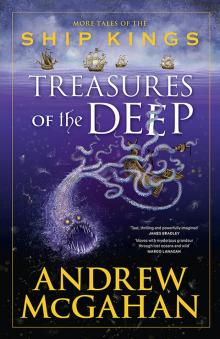 Treasures of the Deep
Treasures of the Deep The Rich Man’s House
The Rich Man’s House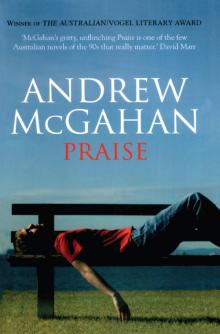 Praise
Praise The White Earth
The White Earth 1988
1988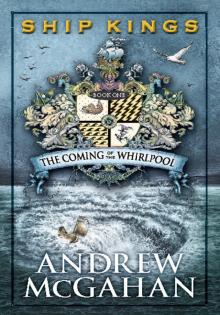 The Coming of the Whirlpool
The Coming of the Whirlpool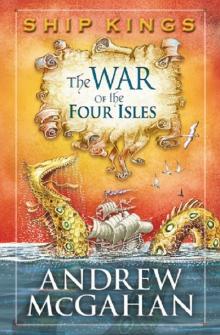 The War of the Four Isles
The War of the Four Isles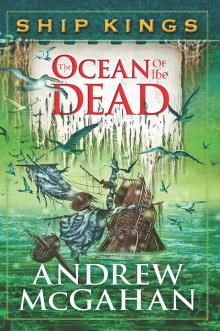 The Ocean of the Dead: Ship Kings 4
The Ocean of the Dead: Ship Kings 4 Last Drinks
Last Drinks Wonders of a Godless World
Wonders of a Godless World Underground
Underground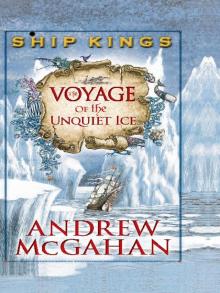 The Voyage of the Unquiet Ice
The Voyage of the Unquiet Ice